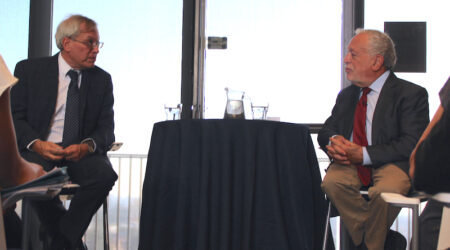On December 5, 2019, the Social Science Matrix “Authors Meet Critics” Series featured Professor Wendy Brown, author of In the Ruins of Neoliberalism: The Rise of Anti-Democratic Politics in the West, in dialogue with Gillian Hart, Professor Emerita, Department of Geography at UC Berkeley, and Tianna Paschel, Professor in the Departments of African American Studies and Sociology at UC Berkeley.
In her opening remarks, Brown explained that her book’s focus is “the deliberate, multi-pronged neoliberal assault on the institutions, venues, practices, and values of democracy.” She said that her book was animated by a variety of questions related to the connection between neoliberalism and anti-democratic forces.
“Neoliberalism generates extreme inequality of wealth and access through its stripped-down welfare state, privatization of public goods, regressive taxation, deregulation, union busting, and rapid deindustrialization,” she said. “But why does rebellion against this extreme inequality take such an anti-democratic form?… Why do we get a hard right instead of left response to extreme capitalist depredations and crises?”
Other questions motivating her book, she said, relate to the role of neoliberal reason in “generating the ethnonationalism and conservative family values within this anti-democratic retort,” as well as the question of how “the combination of neoliberal socioeconomic dethronement of the white working- and middle-classes conjoin with traditional values mobilization — and an ever intensifying nihilism — to turn or convert so-called conservative values into a more explicit project of attempting to re-secure white male supremacy, both at the state and civic levels, and restore it at the familial or cultural levels.”
Brown also said she sought to answer the question, “what is the relevance of the fact that, instead of a neoliberal utopia, what many of us in the trade have come to call ‘actually existing neo-liberalism’ generated a political formation that the founding neo-liberals themselves would have abhorred.”
Her argument, she said, is that “neo-liberalism tilled the ground for an anti-democratic right wing revolt. And that argument is built both from an examination of the critiques of democracy by the original neo-liberals and through trying to think through how, in ‘actually existing neo-liberalism,’ their vision was significantly distorted by forces that they ignored or neglected, from political power to diseducation to the acceleration of nihilism in our time.”
Following Brown’s remarks was Professor Gillian Hart, who praised the book’s core premise, noting that “there actually are absolutely huge political stakes in how we think about neo-liberalism in relation to the attenuation of democracy.” In her comments—which included a chapter-by-chapter analysis of Brown’s book—Hart noted that “what has happened is the hopes for widespread social and economic justice are very systematically being inverted. And what we are left with is a sort of an outer shell of liberal democracy, a horrendously unequal, divided populace and massive growing popular anger that often takes the form of xenophobia and femicide.”
Professor Tianna Paschel also provided a critique of Brown’s book, describing it as a “timely piece of work…that will be discussed and debated for decades to come.” Paschel noted that the book focuses on the “archetype of the right-wing, white nationalist populace, which is the white, working-class and/or poor, rural midlander man who has in some way experienced the devastating impact of de-industrialization, the ‘race of the bottom,’ and other neoliberal economic reforms at the same time that they felt this kind of devaluation.”
“I understand the attention to this demographic, and I also appreciate the nuanced discussion of nihilism, futurity, and white men,” Paschel said. “However, I want to know if focusing too much attention on this specific demographic, or even on white evangelicals, if by doing so we miss whiteness’s more broad function under this current moment…. Marx famously talked about workers under capitalism having nothing left to bring to market but their labor power, right? Perhaps rather than white male privilege being dethroned or even wounded, I want to suggest that the stripping away of economic stability for some white workers and poor whites has actually left white men in this category to have nothing but their white maleness to bring to market or to politics, which under neoliberalism are such similar things.”


